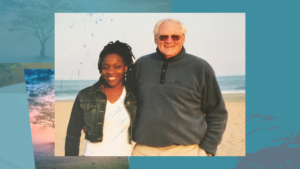I’ve been thinking a lot about death—about my mortality. Am I depressed? No. Suicidal? Definitely not. At one point, we all have to think about our mortality. After all, death is a part of life. If we are living, then we, like every living thing, will eventually die. It is just a fact of life. We can live in denial or simply face it. In facing it, death can teach us powerful lessons about life.
1. To appreciate life’s entirety—its joy and suffering—we must confront our mortality. We have heard it said over and over again: “Life is short,” and, indeed, it is. All we have is TODAY—the present, that is guaranteed. Yesterday is gone, and tomorrow is not promised. So we live each day with an awareness that we are alive with a purpose, a heart of gratitude that we should be thankful for every day gifted to us, and a God-consciousness of his love all around us. From the day we are born, we cling to things, people, places, and emotions like a baby clinging to her mother’s arm. Yet, this innate desire to attach is our soul’s cry to be reattached to its Creator. This reattachment is made possible through Christ’s sacrificial love.
Lesson: We must confront our own mortality to enter into life fully.
2. In reattaching to Christ, we learn to die. Die to what, you may ask? To our false self—the self that is prideful and egotistical. We hold grudges because our feelings got hurt. Although we may have the right to feel the way we do, we become imprisoned, stuck, and depowered by them. We hold firm to our position of ‘right-eous-ness’ because it is more important for us to be correct at the cost of tearing down rather than to show love for the sake of building up. But death strips us of such falsehoods and more, showing us what matters most in life. But wait, how can we gain such insight and still be alive?
South Korea is known to have some of the highest suicide rates. To combat this problem, Hyowon Healing Center in Seoul implemented the idea of a two-and-a-half-hour mock funeral. Thousands of South Koreans have rehearsed their deaths. In this program, they have the opportunity to write their last testament as they sit next to their casket. Then they adorn themselves in their burial dress and lie in their coffin, which has been nailed shut, for 10 minutes. At the end of the session, the participants are told they have shed their old selves. They are reborn to have a fresh start. I have no idea how successful this program is, but it gives some participants a fresh outlook on life similar to many near-death experiences.
Lesson: We must die to our old selves to see with new eyes.
3. In Christianity, this notion of rebirth involves dying to the old self as one now lives from Christ-centeredness. The Apostle Paul describes this newness of life as being a new creature in Christ. However, many times, we still live out of our old or false selves. Our pride, our fears, or our shame blind us from enjoying life as we should. We spend way too many years depressed, living in a state of anxiety and fear. And life is way too short for that.
Lesson: Die to the false self; live through Christ the new self.
4. To learn to die to the false self is to open our hearts to God’s love all around us. It means to live in the mode of forgiveness with a heart of gratitude and a position of humility. To die to the false self is to expose our hearts. And that may be a scary experience for many. But if Christ took the risk, exposing his heart on the cross, we can too. Out of death comes new life. When we die to our false self, our true self in Christ arises, giving us a new perspective on life.
Lesson: All life is considered spiritual.
On this journey called life, we all have to face our mortality. As a proverb says, take from death before death takes from us. Let’s learn to take these lessons from death and die to the false self to appreciate all of life. Andrea Chappelle, a friend I met on my journey of life, recited the prayer of St Francis, the last few lines of which state: “It is in giving that we receive, in pardoning that we are pardoned, and in dying that we are born to eternal life.”








